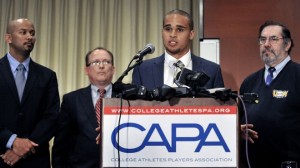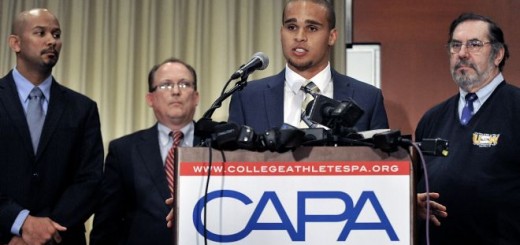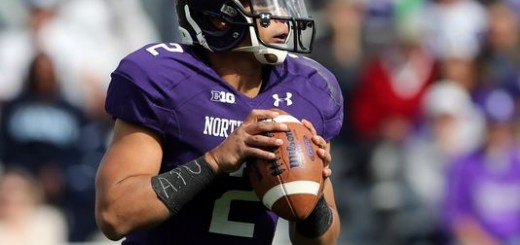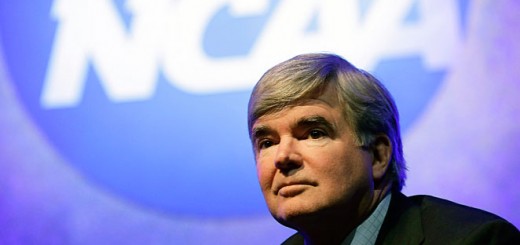Tweet
OFFICIAL STATEMENTS

Northwestern quarterback Kain Colter second from right, speaks while College Athletes Players Association president Ramogi Huma left, United Steel Workers National Political Director Tim Waters second from left, and United Steel Workers president Leo Gerard right, look on during a news conference in Chicago. (AP)
Northwestern and the NCAA have both made statements regarding this attempt to unionize, with vastly different tones and acceptances. Northwestern offered the opinion that its students are “leaders and independent thinkers.” They subtly show their hand in approving the move by throwing out that they are proud of their students and this action exemplifies the institution’s teachings (well, either that or they are trying to solely emphasize the word independent in a way to say “NCAA leave us out of this, it isn’t us).
The NCAA, on the other hand, starts off saying, “This union-backed attempt to turn student-athletes into employees undermines the purpose of college: an education.” While the wording may be a bit misleading, they are merely highlighting the basic tenets of the organization. The original moves of the NCAA to distance itself and its institutions from commercialization, etc. went hand in hand with getting an education. Schools/teams were getting competitive advantages by using players (ringers) that were not enrolled in the school, present only to win games and bring more reverence (and money) to the program. Some might say that turning student-athletes into employees does nothing to deter from an education, and that many students in fact hold jobs while completing their education. That may be the case, but by making student-athletes employees, one of the earliest NCAA beliefs is thrown out the window. The decision was made to ensure athletes weren’t just participating in athletics, and that intercollegiate athletes’ growth took place both on the field and in the classroom.
NIPPING IT IN THE BUD – IF THE NCAA IS NOT THE EMPLOYER
In today’s statements, a union representative said that player compensation is not an immediate goal, but could be in the future. IF, and I believe this is a huge if, these student-athletes were considered employees and could unionize, who is the employer that the players would meet in negotiation? Who is paying the compensation? One possibility is that those responsible for the TV contracts (ESPN, FOX, etc.) would be the “employers.” Another possibility is the school of the unionized student-athlete. From the institution side, if the network happened to be the employer and the student-athlete sat out of games as a negotiating tactic, then there is nothing to stop the school from rendering the student-athlete ineligible. In addition, there is also the possibility that the institution removes the student-athlete’s scholarship for what amounts to a breach of contract (if they are paying for education in exchange for athletic ability, consideration is removed once the athletic ability is no longer offered to the institution).
In either case, compensation could theoretically be bargained without consulting the NCAA. While it is illegal to discriminate against employees based on union association, the NCAA would not be the employer, they would remain the governing body that should not be limited by bargaining third parties. The NCAA has the simple answer of saying that any unionized student-athlete is ineligible for participation in intercollegiate athletics due to a violation of amateurism. On top of this possibility, the NCAA may take offense to the possibility of recruiting advantages potentially offered by unionization. Not every state looks favorably upon unions, and unions of state employees (if student-athletes at public schools unionized) are governed by state law. We are now looking at a situation where private universities in pro-union states have a marked recruiting advantage for prospects that are looking for the union protection. Barring the finances of the “haves” and “have-nots,” the NCAA has many rules to level out recruiting, and doesn’t take too kindly to variables that skew this balance.
Should anyone disagree with the NCAA in what would likely be an anti-union stance, no one is making them go to college or play college sports. Participation in college athletics is completely voluntary. Due to the age restrictions set by the professional leagues (NBA and NFL, where the unionizing of student-athletes would be most likely to occur), most athletes go into college for national exposure (and development, since the majority of professionals are/were not pro-ready exiting high school). Just as collegiate athletics is voluntary, college is not a requirement either for these leagues. Brandon Jennings and Jeremy Tyler went to play overseas before making their entrance into the NBA. While it may not be the best career move, a football player could similarly go into the CFL or Arena Football League should they disagree with the restrictions of college athletics. By becoming a member of an NCAA institution, you are essentially agreeing to whatever restrictions they decide to impose, which could include any decision of union involvement.
THE EFFECT OF TITLE IX
Let’s say the NCAA is the employer in a proposed union situation, and the NCAA is the body that divvies up paychecks for unionized student-athletes. The existence of only football student-athlete unions would theoretically offer the chance for these student-athletes to be paid. Welcome to the conversation, Title IX! If the NCAA offered a chance for male student-athletes to get paid, regardless of what the distinction (football) might be, enjoy trying to avoid paying female student-athletes. Female student-athletes would have to be allowed to unionize as well, and reap the same benefits, as Title IX demands. Unionization may bring about money for both genders, but depending on the amounts of money offered to each gender, the Title IX balance could be tipped.
Let us return for a moment to the institution being the negotiating employer. Union or not in each sport/gender, should this compensation come into play, Title IX would force a school to offer similar employment for female sports. In the totality of collegiate sports, not that many athletics departments make money. These schools aren’t necessarily making piles of profit (and the NCAA is definitely not sitting in a pure-gold castle in Indianapolis). What little extra money there is with the NCAA or an institution is getting funneled back into the athletics departments, paying for programs like field hockey or subsidizing the “have-nots” in an attempt to balance competition. If these schools suddenly had to start increasing costs based on unionized student-athletes, any benefits that may arise would also have to be offered to female student-athletes. Rising costs would inevitably lead to some Division I school saying, “You know what? Screw it. Have fun unionizing and raising costs when we’re scrapping athletics.”
______________
Whether or not this unionization is allowed to occur (the student-athletes face the Everest-like uphill battle of being considered employees), if the NCAA is not at the negotiation table then there is a very good chance that the whole process is useless and ineffectual. First, any “benefits” received as a member of the union could just render the student-athlete ineligible should the NCAA decide to take a hardline stance. Too many discrepancies would occur between public and private schools, schools in different states, and even sports/genders within each institution’s intercollegiate athletics programs that could throw the balance within the NCAA out of kilter. In the end, without the backing of the NCAA, any eligible student-athletes in the near future will likely remain unaffiliated with a union. Whatever unions may offer to student-athletes, this would be a step away from one of the current core beliefs of the NCAA, a step that the NCAA is likely unwilling to take.



Recent Comments